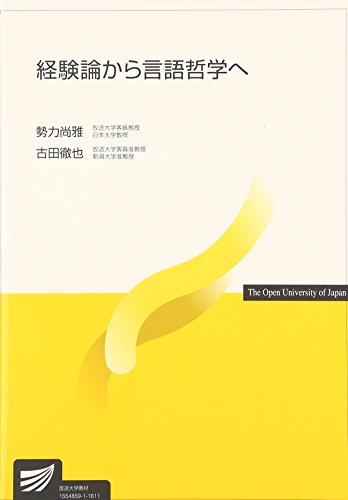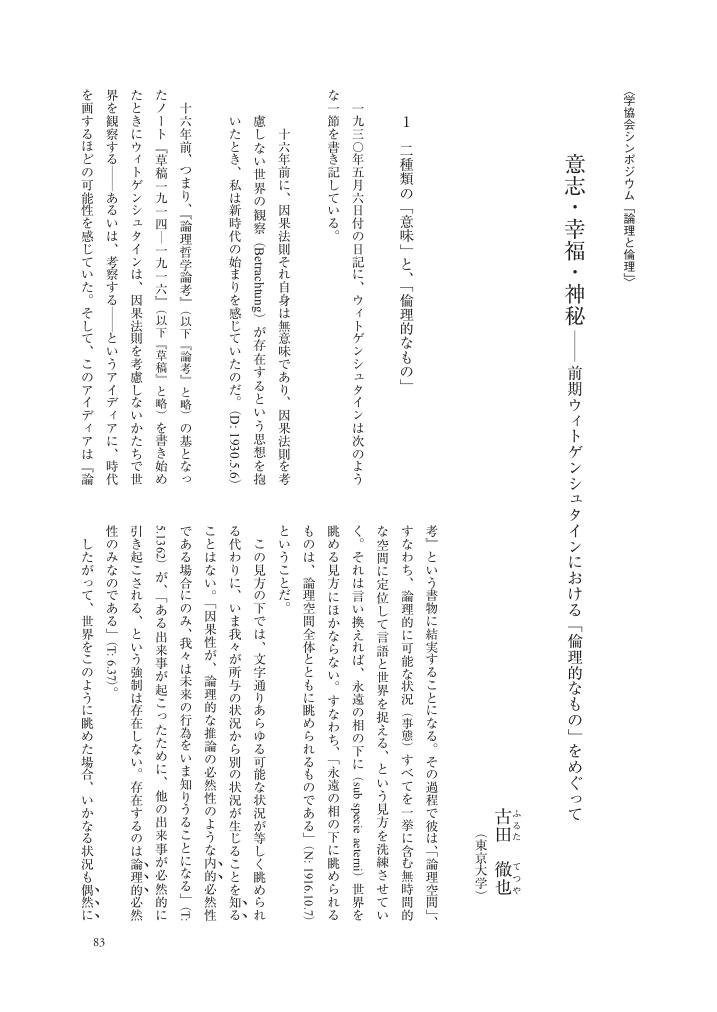11 0 0 0 OA 「ウィトゲンシュタイン的独我論」 の構造と意義
- 著者
- 古田 徹也
- 出版者
- The Philosophy of Science Society, Japan
- 雑誌
- 科学哲学 (ISSN:02893428)
- 巻号頁・発行日
- vol.47, no.1, pp.53-66, 2014-07-30 (Released:2015-07-24)
- 参考文献数
- 5
This review concerns Professor Hitoshi Nagai's recent book, Wittgenstein no Goshin (Wittgenstein's Misdiagnosis). In this book, Professor Nagai makes his understanding of the latter part of Wittgenstein's “Blue Book”. He argues that Wittgenstein set up an epoch-making solipsism, which Professor Nagai calls “Wittgenstein's solipsism” or “linguistic solipsism”, but he adds that Wittgenstein himself misunderstood the meaning and significance of this solipsism. In this review, I consider the validity of Professor Nagai's arguments.
4 0 0 0 OA 生死をめぐる極限的事例が示すもの : 生命倫理の問題設定と解決のあり方に関する考察
- 著者
- 古田 徹也
- 出版者
- 東京大学グローバルCOEプログラム「死生学の展開と組織化」
- 雑誌
- 死生学研究 (ISSN:18826024)
- 巻号頁・発行日
- vol.11, no.1, pp.249-272, 2009-03-15
講演
3 0 0 0 OA 絶対的価値と相対的価値: 宇宙開発の意義についての一視点
- 著者
- 古田 徹也 Furuta Tetsuya
- 出版者
- 宇宙航空研究開発機構(JAXA)
- 雑誌
- 宇宙航空研究開発機構特別資料: 人文・社会科学研究活動報告集: 2015年までの歩みとこれから = JAXA Special Publication: Humanities and Social Science Studies for Space Exploration: Current Status and Future Perspectives (ISSN:1349113X)
- 巻号頁・発行日
- vol.JAXA-SP-15-017, pp.133-144, 2016-03-07
資料番号: AA1630007010
3 0 0 0 OA 共同行為の構成条件
- 著者
- 古田 徹也
- 出版者
- 日本哲学会
- 雑誌
- 哲学 (ISSN:03873358)
- 巻号頁・発行日
- vol.2012, no.63, pp.265-279_L15, 2012 (Released:2012-10-16)
- 参考文献数
- 11
Discussions of “joint action” or “collective action” that have developed out of English-language works on action theory might be said to have arisen from the intuition that action alone and action in a group are distinctly different things. But is it really necessary to conceptually distinguish joint action from the action performed by individuals? If it is necessary, how should we characterize joint action? This paper seeks an answer to these fundamental questions. In Section 1, I first argue that it is possible to define joint action as distinct from individual action. I then propose a definition of joint action in terms of the interdependency of action by multiple agents. In Section 2, noting that most existing theories of joint action describe it as an entanglement of each individual' s propositional attitude (intention, belief, etc.), I argue that we need to understand joint action not at the level of propositional attitude but, rather, at the level of action. In Section 3, I critically consider the idea that it is necessary to specifically characterize a group as an agent distinct from the individuals performing a joint action. Finally, in Section 4 I show that the scope of an action, as well as the scope of agents of joint actions, can be determined not a priori but only within the context of the particular event, and that the concept of joint action should be examined in association with ethical concepts such as “negligence”, “fault”, and “responsibility”.
3 0 0 0 IR 言葉の絵画性 : デイヴィドソンのメタファー論再考
- 著者
- 古田 徹也 FURUTA Tetsuya
- 出版者
- お茶の水女子大学
- 雑誌
- お茶の水女子大学人文科学研究 (ISSN:18801633)
- 巻号頁・発行日
- vol.8, pp.1-12, 2012-03-30
3 0 0 0 OA 生死をめぐる極限的事例が示すもの : 生命倫理の問題設定と解決のあり方に関する考察
- 著者
- 古田 徹也
- 出版者
- 東京大学グローバルCOEプログラム「死生学の展開と組織化」
- 雑誌
- 死生学研究 (ISSN:18826024)
- 巻号頁・発行日
- vol.11, no.1, pp.249-272, 2009-03-15 (Released:2012-04-11)
講演
2 0 0 0 「人生の意味」に関する分析実存主義的研究と応用倫理学への実装
本年度は北海道哲学会でシンポジウム「人生の意味」(研究代表者・藏田伸雄、研究分担者・森岡正博、研究協力者・山田健二)、日本倫理学会でワークショップ「「人生の意味」の哲学的・倫理学的議論の可能性」(研究代表者及び研究分担者・村山達也、研究協力者・文武吉沢、研究協力者・長門裕介)、科学哲学会でワークショップ「分析哲学/現代形而上学で「人生の意味」や「死」について「語る」ことはできるのか」(研究代表者及び研究分担者・久木田水生、研究協力者・鈴木生郎)を実施し、本研究の研究成果の一部を公開した。また研究代表者の藏田は日本生命倫理学会で「「人生の意味」というカテゴリーを生命倫理領域で用いる場合に注意しなければならないこと」と題する発表を行い、「人生の意味」に関する議論を終末期医療に関する生命倫理問題に接続することを試みた。また研究分担者と研究協力者による研究会も開催し、研究協力者の北村直彰氏によって死の形而上学について、また杉本俊介氏によって「人生の意味」とWhy be Moral問題についての検討を行った。また本研究課題に関連する問題についていくつかの論考を発表している研究分担者の山口尚氏の一連の論文を批判的に検討することを通じて、人生の意味と「決定論」や「自然主義」との関連について明らかにすることができた。特に、今年度は青土社の雑誌『現代思想』が分析哲学に関する別冊を発行したが、その中で研究分担者の森岡、村山、研究協力者の山口がこの研究班での研究の成果や、本研究と関わる内容について論文を掲載している。また本研究班での研究内容とは異なるが、研究分担者の近藤と古田は「道徳的な運」に関する研究成果を発表している。「道徳的な運」の問題は、本研究の直接的なテーマではないが、「人生の意味」に関する問題とも深く関わる。
2 0 0 0 OA 人間の「脆さ」に着目した状況依存的かつ相互依存的な行為者概念の学際的研究
- 著者
- 早川 正祐 竹内 聖一 古田 徹也 吉川 孝 八重樫 徹 木村 正人 川瀬 和也 池田 喬 筒井 晴香 萬屋 博喜 島村 修平 鈴木 雄大
- 出版者
- 東京大学
- 雑誌
- 基盤研究(C)
- 巻号頁・発行日
- 2015-04-01
本研究は、従来の行為者理論において見落とされてきた、人間の「脆弱性」(vulnerability)に着目することにより、自発的な制御を基調とする主流の行為者 概念を、より相互依存的・状況依存的なものとして捉え直すことを目的としてきた。その際、行為論・倫理学・現象学・社会学の研究者が、各分野の特性を活か しつつ領域を横断した対話を行った。この学際的研究により、個別領域にとどまらない理論的な知見を深め、行為者概念について多層的かつ多角的な解明を進めることができた。
2 0 0 0 OA 共同行為の責任と倫理に関する学際的研究
- 著者
- 木村 正人 野矢 茂樹 早川 正祐 竹内 聖一 吉川 孝 古田 徹也 池田 喬 河島 一郎 星川 道人 島村 修平 筒井 晴香 八重樫 徹 萬屋 博喜
- 出版者
- 高千穂大学
- 雑誌
- 基盤研究(C)
- 巻号頁・発行日
- 2009
分析哲学者を中心に昨今注目を集めている共同行為論の諸理論について紹介・検討し、さらに現象学、社会学理論等による知見を加えて、共同行為の構成要件、共同行為特有の意図性の諸原理、還元主義アプローチの当否、共同行為論における因果的解釈の射程などについて明らかにした。若手研究者を中心として組織された「行為論研究会」は学問分野を越える各学会等で注目を集め、一般公開の研究大会において報告されたその成果は、雑誌『行為論研究』にまとめられた。
1 0 0 0 経験論から言語哲学へ
- 著者
- 勢力尚雅 古田徹也著
- 出版者
- 放送大学教育振興会
- 巻号頁・発行日
- 2016
1 0 0 0 OA 意志・幸福・神秘 前期ウィトゲンシュタインにおける「倫理的なもの」をめぐって
- 著者
- 古田 徹也
- 出版者
- 日本哲学会
- 雑誌
- 哲学 (ISSN:03873358)
- 巻号頁・発行日
- vol.2022, no.73, pp.83-95, 2022-04-01 (Released:2022-07-21)
- 参考文献数
- 12
- 著者
- 古田 徹也
- 出版者
- 日本科学哲学会
- 雑誌
- 科学哲学 (ISSN:02893428)
- 巻号頁・発行日
- vol.47, no.1, pp.53-66, 2014
This review concerns Professor Hitoshi Nagai's recent book, <i>Wittgenstein no Goshin (Wittgenstein's Misdiagnosis)</i>. In this book, Professor Nagai makes his understanding of the latter part of Wittgenstein's "Blue Book". He argues that Wittgenstein set up an epoch-making solipsism, which Professor Nagai calls "Wittgenstein's solipsism" or "linguistic solipsism", but he adds that Wittgenstein himself misunderstood the meaning and significance of this solipsism. In this review, I consider the validity of Professor Nagai's arguments.
1 0 0 0 IR 現代の英米圏の倫理学における運の問題 (特集 運・倫理・政治)
- 著者
- 古田 徹也
- 出版者
- 南山大学社会倫理研究所
- 雑誌
- 社会と倫理 (ISSN:13440616)
- 巻号頁・発行日
- no.32, pp.3-14, 2017
現代のように多様な価値観や情報が溢れる時代においては、我々の実践的文脈を離れた理性の明証性に訴えるような(通俗的な)個人主義的啓蒙思想は説得力を欠く。個人主義的啓蒙思想の理念に訴えるのでもなく、また権威に盲従するのでもなく、我々の実践に根差した形で思考し行為することの意義を徹底的に考える哲学としての常識哲学は、今日ますますその重要性を高めている。本研究の目的は、これまで十分に検討されてこなかったこの常識哲学の展開を哲学と思想史の両面から明らかにし、その洞察と限界を見極めるとともに、それを通して現代の我々が様々な問題について思考する際に常識の果たすべき役割を明らかにすることである。
本研究では、「人生の意味」に関するメタ倫理学的研究と「死」の形而上学的研究との関連を、「人生の意味」についての規範的議論を手掛かりにして検討する。さらに「人生の意味」という概念の規範性について批判的に検討する。またこの分野での主張に見られる、「人生の意味」に関する命題についても真理条件が成立するという前提について検討を進める。そして決定論的な世界観を採用することは、「人生の意味」の価値を減じるのかという問題について分析する。
1 0 0 0 OA 18世紀から20世紀にかけての英語圏を中心とした常識概念の思想史的、哲学的検討
本研究グループは科研費受給期間中コンスタントに研究成果を発表した。主な活動を四点挙げる。第一に「常識と啓蒙研究会」を年二回開催した。第二に、2018年3月に日本イギリス哲学会第42回研究大会においてセッション「コモン・センスとコンヴェンション―18世紀英米思想における人間生活の基盤」のコーディネイトと研究報告を行った。第三に、2019年10月に武蔵野大学政治経済研究所主催のオール英語の国際シンポジウムをコーディネイトし、本研究グループと米国の研究者が研究報告を行った。第四に、2020年2月には本研究プロジェクトの最終報告として『「常識」によって新たな世界は切り拓けるか』(晃洋書房)を出版した。
- 著者
- 熊野 純彦 木村 純二 横山 聡子 古田 徹也 池松 辰男 岡田 安芸子 吉田 真樹 荒谷 大輔 中野 裕考 佐々木 雄大 麻生 博之 岡田 大助 山蔦 真之 朴 倍暎 三重野 清顕 宮村 悠介 頼住 光子 板東 洋介
- 出版者
- 東京大学
- 雑誌
- 基盤研究(B)
- 巻号頁・発行日
- 2017-04-01
2018年度は、本研究の主要達成課題のうち、「各層(家族・経済・超越)の各思想の内在的理解」を中心とする研究がなされた。近現代日本の共同体論を再検証するにあたっては、2017年度で取り組まれた「和辻共同体論の参照軸化」に加え、家族・経済・超越それぞれの層に関連する思想を巡る形成の背景に対しても、テクストに内在した読解を通じて光を当て直す必要がある。以下、そうした問題意識のもとに取り組まれた、2018年度の関連実績のうち主要なものを列挙する。(1)研究代表者の熊野純彦は、著書『本居宣長』において、近世から現代に至るまでの代表的な思想家たちによる宣長の思想の受容過程を丹念に整理・検証することで、それを近代日本の精神史の一齣として提示することを試みた。それを踏まえたうえで改めて宣長のテクストの読解を行い、今日の時代のなかでその思想の全体像を捉えかえそうとしたところに、本業績の特徴がある。(2)研究分担者宮村悠介は、主に本研究の研究分担者からなる研究会(2018年9月)にて、研究報告「家族は人格ではない 和辻共同体論のコンテクスト」を行い、和辻倫理学の形成過程におけるシェーラーの影響と対話の形跡を、具体的にテクストをあげつつ剔抉した。これは、翌年度の課題である「思想交錯実態の解明」にとってもモデルケースとなる試みである。(3)超越部会では台湾の徐興慶氏(中国文化大学教授)を招聘、大陸朱子学と、幕末から近代に至るまで様々な思想に陰に陽に影響を及ぼしてきた水戸学の影響関係について知見をあおいだ(「「中期水戸学」を如何に読み解くべきか 徳川ミュージアム所蔵の関係資料を視野に」2018年)。これにより、広く東アジアの思想伝統と近世以降現代に至るまでの日本思想の受容・対話の形跡を実証的に検証することの重要性を改めて共有できたことは、本研究の趣旨に照らしても重要な意義を持つと思われる。
1 0 0 0 文化に入り行く哲学 : デイヴィドソンの言語哲学の限界をめぐって
- 著者
- 古田 徹也
- 出版者
- ミュー
- 雑誌
- フィルカル : philosophy & culture : 分析哲学と文化をつなぐ
- 巻号頁・発行日
- vol.1, no.1, pp.112-140, 2016-03-31

